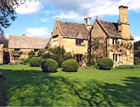Becoming a House Detective – part two
Melanie continues her crash course on tracing the history of your own house through public records and other documents


My last blog looked at how to start researching the history of your own house; introducing some of the key sources and ways of uncovering the mysteries hidden in the story of a house. I began by looking at the local history; a warning about gaps in documents and sources; as well as using maps and census records. In this second part of ‘Becoming a House Detective' I will guide you to other sources that will help you in researching the history of your own home.
Occupational records Along with census records, there are some additional occupational records that record the people who were living in your house at different times in the past. For the late 19th and throughout the 20th centuries, Electoral Registers show the residents in the house who were eligible to vote. This can be a fantastic source for the 20th century when there are few other sources, however it is worth remembering that throughout history (and especially in the earlier years) not everyone was able to vote, so won't be recorded. The other small challenge is that details of family relationships are not given, so you may find a long list of names and not be sure who were the parents, the children, or even the servants.
Further occupational records that are excellent for researching houses are Street and Trade Directories (like an early phone book). Early versions record the head of the house and their trade from that address, while later versions began to show the head of the house at every address. There are also Court directories or Court Guides, which offer fantastic information for London houses, recording occupants from the nobility and gentry who were in London for the social season.
Tax records Parish and national tax records are very useful in tracing both the owner and occupant of a house. Rate books record those paying the local rates, like an early version of council tax. The dates and availability of records varies from area to area, but you can find some good information about those in the house, as well as gauge the value of the house (the rate paid was based on the value of the property). Land tax records are similar and are especially useful in rural areas.
Another key record is the 1910 Inland Revenue Valuation Survey, undertaken when the Prime Minister, David Lloyd George, introduced a new land tax. Records are held in the National Archives and show the individual property on a map, with an accompanying field book giving a description and value of the property, along with details of the owner and occupant.
Deeds, archives and documents Documents specifically related to your house, including deeds and mortgage documents can be found in county record offices, but these can be rare. You may be fortunate to hold the original deeds, but in a lot of cases they no longer exist, having been discarded or lost over time. They can provide a full overview of the transfer of the property and details of former owners and occupiers. However, if you don't have access to deeds, you may also be able to track details of the transfer of property through estate or manorial records, as well as wills, probate and legal disputes.
Other documents and archives that can also be very useful in researching the history of a house include old estate agent sales particulars, photographs and newspapers.
Exquisite houses, the beauty of Nature, and how to get the most from your life, straight to your inbox.
Researching the history of a house can be a fascinating adventure. There may be a few challenges and you have to turn detective to uncover the stories, but there is a wealth of information to find. Digging up stories of former occupants; architectural features that are unique to your home; or even uncovering a famous occupant or dramatic story attached to the history of your house.
For more insight and inspiration you can look at earlier house stories in the property blog or view my blog - The House Historian
Country Life is unlike any other magazine: the only glossy weekly on the newsstand and the only magazine that has been guest-edited by His Majesty The King not once, but twice. It is a celebration of modern rural life and all its diverse joys and pleasures — that was first published in Queen Victoria's Diamond Jubilee year. Our eclectic mixture of witty and informative content — from the most up-to-date property news and commentary and a coveted glimpse inside some of the UK's best houses and gardens, to gardening, the arts and interior design, written by experts in their field — still cannot be found in print or online, anywhere else.
